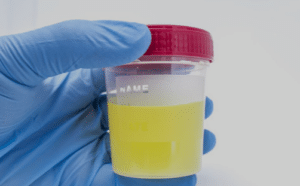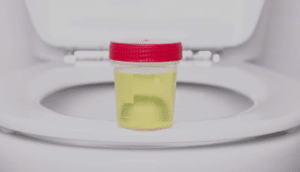Deciphering Cloudy Urine: Causes, Concerns, and Care

Urine, often overlooked in everyday conversation, can hold crucial clues about our health. While it typically appears clear and pale yellow, variations in color and clarity can indicate underlying health conditions. One such deviation is cloudy urine, a phenomenon that might raise concerns. In this blog post, we delve into the intricacies of it, exploring its causes, potential implications, and steps for management.

Understanding Cloudy Urine:
Cloudy urine, as the term suggests, refers to urine that appears turbid or murky rather than clear. This visual alteration can stem from various factors, including harmless dietary influences, dehydration, or more serious underlying health issues. Understanding the potential causes behind it is vital for accurate assessment and appropriate action.

Common Causes of Cloudy Urine:

- Dehydration: One of the most common and benign reasons for cloudy urine is dehydration. When the body lacks sufficient fluids, urine becomes more concentrated, leading to increased sedimentation and cloudiness.
- Dietary Factors: Certain foods, particularly those rich in phosphates or calcium, can contribute to cloudy urine. For instance, consuming excess dairy products or foods high in purines (like meat and fish) may result in temporary cloudiness.
- Urinary Tract Infections (UTIs): Bacterial infections in the urinary tract can cause cloudy urine, often accompanied by other symptoms such as a strong, unpleasant odor, frequent urination, and a burning sensation during urination.
- Sexually Transmitted Infections (STIs): Some sexually transmitted infections, such as gonorrhea or chlamydia, can lead to cloudy urine, along with other urinary symptoms.
- Kidney Stones: The presence of kidney stones can cause cloudy urine due to the release of minerals and other substances into the urine.
- Proteinuria: Excess protein in the urine, known as proteinuria, can make the urine appear cloudy. This can be indicative of kidney problems or other underlying health issues.
- Medications and Supplements: Certain medications and supplements, such as vitamin B supplements, can cause changes in urine color and clarity, leading to cloudiness.
When to Seek Medical Attention:
While cloudy urine can often be benign and transient, certain instances warrant prompt medical evaluation:
- Persistent cloudiness accompanied by other urinary symptoms like pain, burning sensation, or foul odor.
- It persisting despite increased fluid intake.
- Cloudy urine in association with fever, chills, nausea, or vomiting.
- Presence of blood in the urine (hematuria) along with cloudiness.
Diagnosis and Treatment:
When evaluating it, healthcare providers may conduct various diagnostic tests, including urinalysis, urine culture, and imaging studies like ultrasound or CT scans. Treatment depends on the underlying cause:
- Dehydration: Increasing fluid intake can help alleviate cloudy urine caused by dehydration.
- Infections: Antibiotics are typically prescribed to treat bacterial infections like UTIs or STIs.
- Kidney Stones: Treatment may involve pain management and interventions to help pass the stones or surgical procedures for larger stones.
- Underlying Health Conditions: Management of conditions such as kidney disease or diabetes may require specialized care and medications.
Preventive Measures:
While not all causes of it are preventable, adopting certain lifestyle habits can reduce the risk:
- Maintain adequate hydration by drinking plenty of water throughout the day.
- Practice good genital hygiene to minimize the risk of urinary tract infections.
- Limit consumption of foods high in purines or phosphates.
- Practice safe sex to reduce the risk of sexually transmitted infections.
- Follow medication regimens as prescribed and inform healthcare providers of any adverse effects.
Conclusion:
Cloudy urine, though often benign, can serve as a vital indicator of underlying health issues. While occasional cloudiness may be harmless, persistent or concerning changes warrant medical evaluation to rule out potential complications. By understanding the various causes, knowing when to seek medical attention, and adopting preventive measures, individuals can take proactive steps towards maintaining urinary health and overall well-being. Remember, when it comes to cloudy urine, clarity is key, both in understanding its causes and addressing any associated concerns.